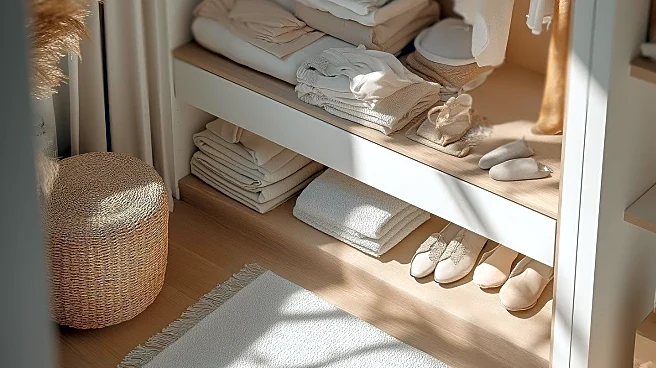What's Happening?
Marie Kondo's KonMari Method has become a transformative approach to home organization, emphasizing the importance of keeping items that 'spark joy.' The method involves tidying by category rather than room, starting with clothes, then books, papers,
miscellaneous items, and finally sentimental objects. This approach encourages individuals to discard items that do not bring joy, promoting a mindset shift towards gratitude and mindfulness in organization. The KonMari Method has gained widespread popularity through Kondo's book and Netflix series, inspiring people to transform their homes into organized, joyful spaces.
Why It's Important?
The KonMari Method's emphasis on joy and mindfulness in organization has significant implications for personal well-being and mental health. By encouraging individuals to focus on what truly brings them happiness, the method fosters a more intentional and fulfilling lifestyle. This approach can lead to reduced stress and increased satisfaction, as people learn to let go of unnecessary clutter and create spaces that reflect their values and priorities. The widespread adoption of the KonMari Method highlights a cultural shift towards minimalism and mindfulness, influencing consumer behavior and home design trends.
What's Next?
As the KonMari Method continues to gain traction, it is likely to influence broader trends in home organization and design. Businesses may respond by offering products and services that align with the principles of joy and mindfulness, such as minimalist furniture and storage solutions. Additionally, the method's popularity may encourage further exploration of mindfulness practices in other areas of life, such as work and relationships. The ongoing impact of the KonMari Method suggests a growing interest in intentional living and the pursuit of happiness through simplicity.
Beyond the Headlines
The KonMari Method's focus on joy and gratitude raises important ethical and cultural questions about consumerism and the value of material possessions. By challenging individuals to reconsider their relationship with their belongings, the method encourages a deeper reflection on what truly matters in life. This shift towards mindfulness and intentionality may lead to long-term changes in societal attitudes towards consumption and sustainability, as people become more aware of the impact of their choices on the environment and their well-being.
















